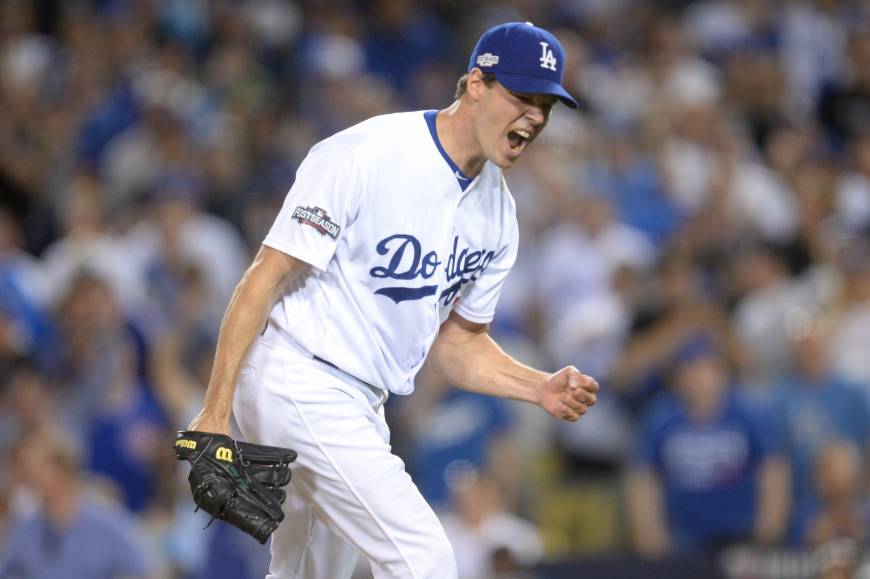A pedestrian pitching parade.
That pretty much describes this winter's crop of free-agent MLB starting hurlers.
There were no power arms of the Max Scherzer variety on the market this offseason, just a bunch of so-so, back-end-of-rotation guys. (Who can still play baseball way better than you and MAS, it should also be noted.)
But that didn't stop clubs from falling all over each other while attempting to snap them up.
Proven hitting?
Meh, most teams could take it or leave it.
How else to explain why a number of veteran but still-productive FA sluggers up for grabs were left to cool their heels while teams first scrambled to fill their starting pitcher rotations?
Edwin Encarnacion, who has averaged 39 HRs and 110 RBIs over the last five seasons, bat-flipper extraordinaire Jose Bautista and Mark Trumbo (last season's MLB home run king with 47), were just a few of the talented free-agent hitters who twiddled their thumbs as teams were in hot pursuit of starting moundsmen like Johnny-come-lately Rich Hill.
For the uninitiated, the 38-year-old Hill had been an anonymous journeyman before discovering late-career mound magic in 2016 with the Oakland A's and Los Angeles Dodgers.
Just two seasons ago, he was toiling for the Long Island Ducks of the independent Atlantic League (its teams have no MLB affiliation). But, after developing a curveball and compiling a combined 12-5 win-loss mark and a 2.12 ERA with the A's and Dodgers last campaign, Hill became one of this winter's most in-demand FA pitching commodities.
Better late than never.
Very early in the free-agent signing period, Hill re-upped with the Dodgers for a whopping $48 million over three years. Rich Hill exemplified this off-season's FA starting pitcher crop.
No aces.
Just a lot of solid-at-best Nos. 3 and 4 starters that teams were all too eager to gobble up at inflated prices.
Ballclubs were desperately seeking to emulate Cleveland and the Chicago Cubs, last season's World Series clubs. Each of whom owed their 2016 success primarily to deep starting pitching.
Not surprising teams would go the monkey-see-monkey-do route. After all, as with other pro sports, MLB is a copycat league. (MAS promises no more zoological similes).
The shifting tides in team construction are almost laughable sometimes. Example: Prior to the 2016 season, teams were scurrying about trying to put offenses together that resembled that of Kansas City, coming off two WS appearances and an MLB championship.
The Royals "keep the line moving" offense, featuring a string of contact hitters that wore down opposing hurlers, was all the rage.
But when KC's plate work dropped off last season and the Royals fell to third place in the American League Central, it didn't take long for their template for success to be replaced by the present deep starting pitching-mania.
This winter, not just Hill, but a whole bunch of mid-rotation types were inked before the sluggers were then somewhat reluctantly signed.
Or so it seemed.
It wasn't until late January, just a few weeks before spring training that Encarnacion and Co. finally inked deals. They had held out in vain for long term, nine-figure deals but ended up settling for Walmart-type money compared to the big contracts given sluggers previously.
The best Encarnacion could get was a "mere" $60 million over three years with Cleveland. Bautista and Trumbo couldn't get the lengthy, big-buck offers they had hoped for elsewhere. So, they returned to their original clubs — tails tucked 'tween their legs — and signed club-friendly deals.
Bautista re-signed with Toronto for only one year at $18.5 mil. Trumbo, meanwhile, represented a real steal of a deal for Baltimore, agreeing to 37.5 million clams over three years.
Moreover, a number of other FA big boppers remained unsigned until just days before spring training opened.
Mike Napoli, Cleveland's 2016 offensive hero (34 HRs, 101 RBIs), finally landed a one year, $8.5 million contract with Texas. And Cris Carter, who racked up 41 HRs and 91 RBIs with Milwaukee in '16, had to "settle" for $3.5 mil to play for the New York Yankees this season.
Hard-hitting Matt Wieters, a four time All-Star who is considered by many to be the greatest all-around catcher in Baltimore Orioles history, is still unsigned.
Adding insult to injury, the moolah thrown at mid-to-back of rotation FA starting pitchers compares favorably to the sums granted their far-more-accomplished batsmen brethren.
Some for instances. Charlie Morton, owner of a career 46-71 win-loss mark and a lifetime 4.54 ERA, inked a $14 million, two-year deal with Houston.
Edinson Volquez (10-11, 5.37 ERA in 2016) got $22 Miami million over two years.
Brett Cecil went 1-7 with Toronto last season. But that didn't stop St. Louis from bestowing $30.5 mil on him for four seasons of mound work.
And Andrew Cashner, who has compiled a 31-53 career record, picked Texas' pocket for $10 million to toe Ranger rubber this season.
MAS could go on but you probably catch his drift by now. Suffice to say, all these hurlers had better timing than career track records working for them in their free agency years.
The sluggers, meanwhile, had the misfortune of being contractually unchained at a point in time where teams frown on long-term deals (more than three years) with older position players.
Too many teams have been stuck with guys signed to long term contracts only to see their skills suddenly diminish with a lot of time still left on their megadeals. (See Philadelphia's Ryan Howard, whose humongous salary was an albatross around the neck of the Phillies for three loooong years.)
Players like Howard became cautionary tales by the time Trumbo, Encarnacion and Bautista, all in their early-to-mid-30s, hit the market.
Encarnacion and Trumbo should probably even be grateful for their three-year deals. Long-term contracts were few and far between this offseason. And those went mostly to closers. Like Aroldis Chapman, who is back with the New York Yankees at a cost of $86 million over five years.
And Mark Melancon inked a $62, four-year contract with the San Francisco Giants.
Even those big-buck signings for save specialists were a surprise — maybe even foolish — in view of the short shelf life of closers these days. And their seeming dime-a-dozen abundance.
Unlike many of his hitting peers, Dexter Fowler landed an extraordinarily lucrative deal. The ex-Chicago Cubs center fielder inked a $82.5 mil, five-year job with St. Louis.
It's quite possible the winter starting pitching signings won't pan out for the ballclubs that engineered them. And those teams won't catch up with Cleveland and the Cubs, as hoped.
It could even be that the now-stalwart Cub and Indian staffs could end up either losing their prowess or encounter a rash of sore arms, a common occurrence these Tommy John-surgery-dominated days.
Should that happen, you can be sure the current hot team construction blueprint would then be quickly abandoned.
And next offseason, MLB clubs will be turning up their noses at the same level of starting pitching that they were salivating over this winter.
Who knows, they may even come full circle and start lusting after sluggers again.
Contact MAS at [email protected]




